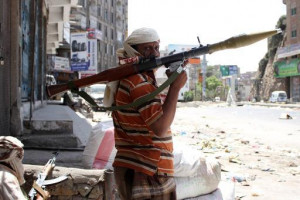
At the same time there’s been attempts to use political and diplomatic means to settle the conflict taken by the coalition forces, apparently, not without a certain amount of pressure from the United States. Thus, a series of statements were made by the Yemeni president in “exile” that indicate that he is willing to reach a compromise with his opponents. It’s curious that Abd Rabbuh Mansur Hadi who had fled to Saudi Arabia refused to hold an international conference on Yemen in Geneva on May 28, since he was reluctant to hold any discussions with rebels. Formally Mansur Hadi welcomed any form of negotiations, but his demands were absolutely unacceptable both for the Houthis and their ally – Ali Abdullah Saleh. Now, he has finally abandoned this futile strategy of finding a compromise. Apparently, Mansur Hadi has changed his position after his meeting in Riyadh with Ismail Ould Cheikh Ahmed, the U.N. envoy to Yemen
The whole situation was affected by the first direct negotiations between the Chief Assistant Secretary of State for Near Eastern Affairs, Anne W. Patterson and the Houthis, that were held in the capital of Oman. The discussion concentrated on the possible ways out of the crisis and the prospects of freeing American citizens that are being held in captivity by the Houthis. Immediately after this meeting Yemen’s rebels released an American freelance journalist Casey Coombs. Anne Patterson has also met with representatives of the Al Saud regime to stress the fact that Washington doesn’t see any other solution to the Yemeni crisis, except for a political one.
It is obvious that the US wants to affect the tempo and outcome of the conflict by negotiating with both sides, but their ability to influence Saudi Arabia’s policies is now severely limited by the the posture of the new king Salman. A coalition of Arab states led by the Kingdom of Saudi Arabia has ultimately failed to find any success on the battlefield by bombing the positions of the Houthis, while a full-scaled land military operation was canceled due to various political reasons and, above all, the fact that Saudi Arabia is not capable of fighting direct wars. On June 3 Russia initiated an extraordinary meeting of the UN Security Council to discuss the situation in Yemen. Before the meeting, council members urged the parties engaged in the conflict to create a humanitarian corridor for the delivery of necessary aid to the population affected by the conflict. Additionally, members of the Security Council underlined the need for all the parties involved to engage in a political dialogue without further ado.
The Saudis authorities must have understood that their support of Mansur Hadi will not grant them any immediate benefits, while the Houthis have already demonstrated their ability to infiltrate Saudi territory to carry out counterattacks under the pretext of liberating “occupied” territories, that in reality are being disputed.
Moreover, the situation in Saudi Arabia itself is quite depressing: the Islamic State has already carried out two terrorist attacks in the Eastern Province against the local Shia communities. The explosions were carried out by the “local” branch of ISIS, which operates in Saudi territory and is not part of Iraq, from which the kingdom walled off to the north. Those attacks have already provoked a Shia rebellion in Saudi Arabia that aims at proclaiming a republic of Qatif and al-Hasa.
On May 29, 2015 an explosion shook a Shia mosque in the city of Dammam leaving three civilians dead, and many more wounded. The local branch of the Islamic State has not simply claimed responsibility for the terrorist attack, but they have also urged “co-believers” to cleanse the territory of Arabia of Shiites and “unfaithful” Saudis alike.

Some urgent steps must be now taken by Riyadh, since fomenting a war against Shiites in Syria, Iraq, Yemen is one thing, and another thing to suppress a Shia rebellion at home, against the background of the Islamic State’s expanding aggression. All of these developments can easily lead to the demolition of the state that is now known as Saudi Arabia.
Peter Lvov, Ph.D in political science, exclusively for the online magazine “New Eastern Outlook”
